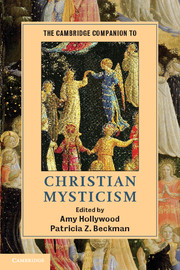Book contents
- Frontmatter
- Contents
- Contributors
- Introduction
- Part I Contexts
- 1 Early Monasticism
- 2 Song, Experience, and the Book in Benedictine Monasticism
- 3 New Forms of Religious Life in Medieval Western Europe
- 4 Early Modern Reformations
- Part II Key Terms
- Part III Contemporary Questions
- Select Bibliography of Christian Mystical Texts up to around 1750
- Select Bibliography of Modern Works Related to the Study of Western Christian Mysticism
- Author and Artist Index
- General Index
- References
4 - Early Modern Reformations
from Part I - Contexts
Published online by Cambridge University Press: 05 December 2012
- Frontmatter
- Contents
- Contributors
- Introduction
- Part I Contexts
- 1 Early Monasticism
- 2 Song, Experience, and the Book in Benedictine Monasticism
- 3 New Forms of Religious Life in Medieval Western Europe
- 4 Early Modern Reformations
- Part II Key Terms
- Part III Contemporary Questions
- Select Bibliography of Christian Mystical Texts up to around 1750
- Select Bibliography of Modern Works Related to the Study of Western Christian Mysticism
- Author and Artist Index
- General Index
- References
Summary
INTRODUCTION
In the study of the Reformation, attention has turned in recent decades to the reform character of the late medieval period as the positive basis of Reformation thought and institutional change, against older views that emphasized only decline as the background to reform. This has the advantage not only of improved accuracy but also of including a wider range of changes under the umbrella of Reformation. It brings Roman Catholicism within the purview of the Reformation, not merely as a reactionary force against Protestant changes (a Counter-Reformation) but also as engaged in its own reforms (a Catholic Reformation). It permits profound connections to be drawn between Roman Catholicism and Protestantism in producing the Reformation. At the same time, the Reformation can no longer be seen as a single change or group of changes emanating from one historical event, such as Luther’s theological breakthrough, but is instead a plural confluence of changes covering the late medieval and early modern periods with a common reform character. Rather than beginning with Luther, therefore, I shall approach the Reformation as a collection of changes – reformations – beginning in the late medieval period. I shall focus on three facets of reform – democratization and laicization, humanism, and interiority. I shall then turn to a number of concrete contexts and figures as representative of the development of mysticism between 1500 and 1700: Martin Luther, Teresa of Avila and John of the Cross, Hans Denck, the Moravians and the Quakers, and Pierre de Bérulle.
DEMOCRATIZATION AND LAICIZATION
Bernard McGinn has drawn attention to a democratization of Christian life that begins in the thirteenth century, affecting mysticism especially. It starts with a change in the understanding of the relation between the world and the cloister. The late medieval understanding of the apostolic life (vita apostolica) shifted from an ideal of flight from the world into secluded and remote monasteries to the possibility of living religious life in the city and engaging in apostolic work among the laity, practices put forward first by the Augustinian canons and then by the new mendicant orders, the Dominicans and Franciscans.
- Type
- Chapter
- Information
- The Cambridge Companion to Christian Mysticism , pp. 114 - 134Publisher: Cambridge University PressPrint publication year: 2012
References
- 15
- Cited by



